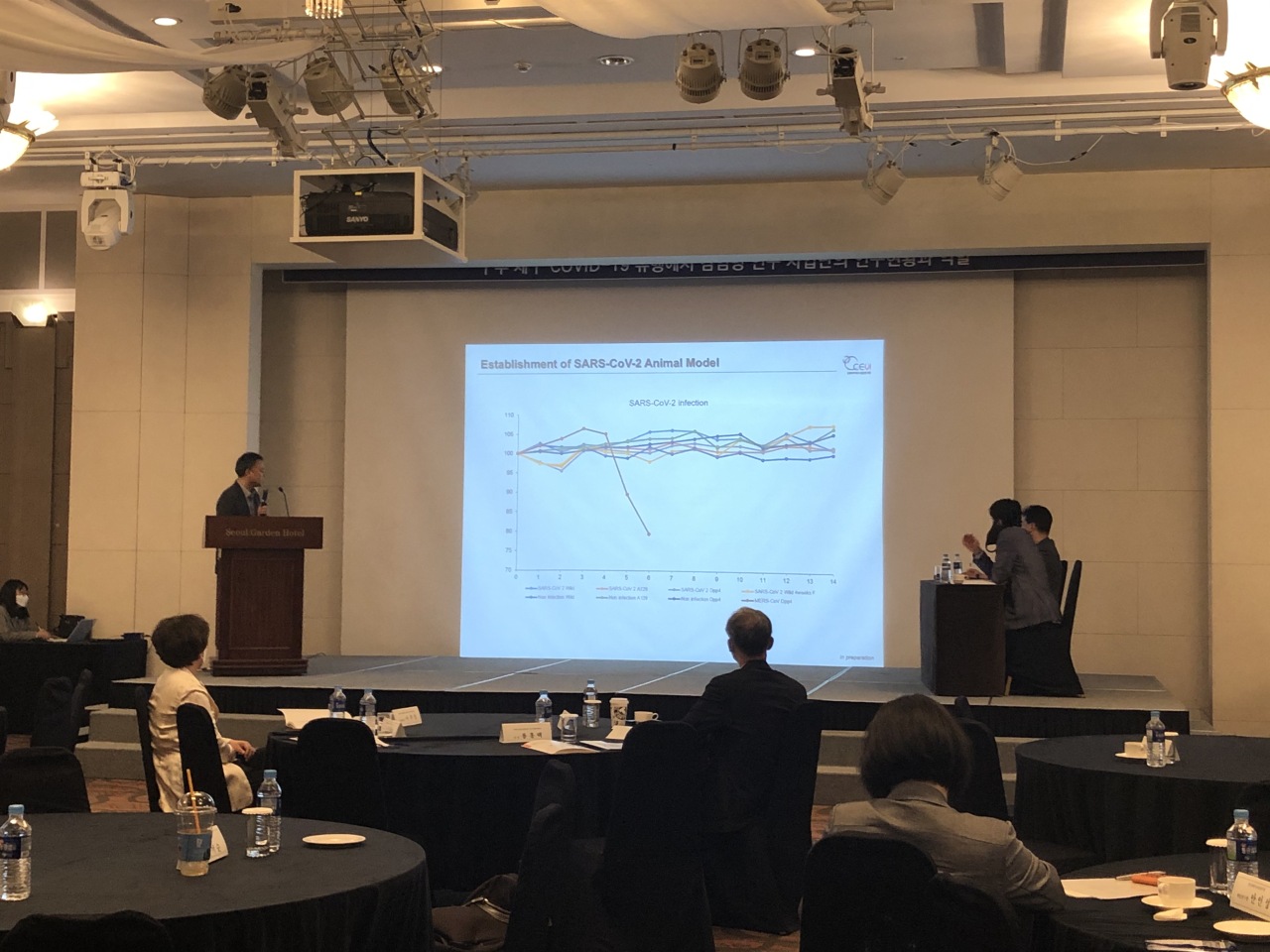 |
A joint symposium of R&D Fund for Infectious Diseases Research and Center for Convergent Research of Emerging Virus Infection was held Wednesday in Seoul to discuss research to understand and stop COVID-19. (Lim Jeong-yeo/The Korea Herald) |
State-run science institutes in South Korea are employing mathematical, chemical and biological research to track and crack the COVID-19 pandemic.
Some of the findings from their pursuits were presented at a gathering of experts hosted by the Government-wide R&D Fund for Infectious Diseases Research and Center for Convergent Research of Emerging Virus Infection on Wednesday in Seoul.
“We have found a new platform for vaccine development for recombinant subunit vaccine,” said Kim Seong-jun, principal researcher of Korea Research Institute of Chemical Technology.
KRICT’s novel design of immunogen leads to effective in-vivo delivery, and guarantees high vaccine efficacy, increased safety without toxicity.
“The novel recombinant subunit vaccine KRICT-SARS-CoV-2-rs-001 may give complete protection against COVID-19,” Kim said.
KRICT aims to license out the platform technology for vaccine development. Kim said that the KRICT’s goal is to create a better vaccine, not the first vaccine.
“Social distancing was more effective in curbing the COVID-19 spread than quick diagnosis,” said Lee Hyo-jung, senior researcher from the National Institute of Mathematical Sciences.
“Had the students returned to school as originally planned on April 6, new cases of COVID-19 infections would have continued till July,” Lee said, citing the NIMS’s research using stochastic metapopulation simulation based on population mobility volume in Daegu, Busan, Seoul and Gyeonggi Province -- surmised from individuals’ mobile data usage.
Lee said research is continuously being validated over time. Using the same mathematical model, the team was able to predict that the peak of COVID-19 infection in Daegu will be in early March, after which the regional epidemic will subside as a result of governmental countermeasures if not for unforeseen cluster outbreaks.
Professor Ki Mo-ran from National Cancer Center, pointed out that mathematical models employed by global institutions yielded various different outcomes, and to draw the full picture one must look at more than one model for comparison.
Ki counted Korea, Germany and Taiwan as the three countries that have so far successfully contained the coronavirus outbreak.
She cautioned, however, that in the case of Korea’s latest Itaewon nightclub cluster, should the infected patients act reluctant to come forward, the number of patients may remain unchanged in the beginning but experience a spike in two weeks’ time.
It would take at least 25 days for the spread to slow down to less than 10 people per day in this case, she said.
Professor Yeom Joon-sup, an infectious disease specialist at Yonsei Univesity College of Medicine and professor Lee Jae-gap of Hallym University Medical Center said COVID-19 has been an impetus for regulatory changes in wearable medical hardware and software for epidemic intelligence framework.
Global surveillance system for influenza-like illness and severe acute respiratory infections are being rewritten to accommodate the COVID-19, while new apps such as KoEID provide an arena for doctors to exchange breaking information on clinical cases and research, Lee said.
Advancements are also taking place in the field of test kits and protective hazmat suits -- topics which were also discussed at the symposium.
By Lim Jeong-yeo (
kaylalim@heraldcorp.com)








